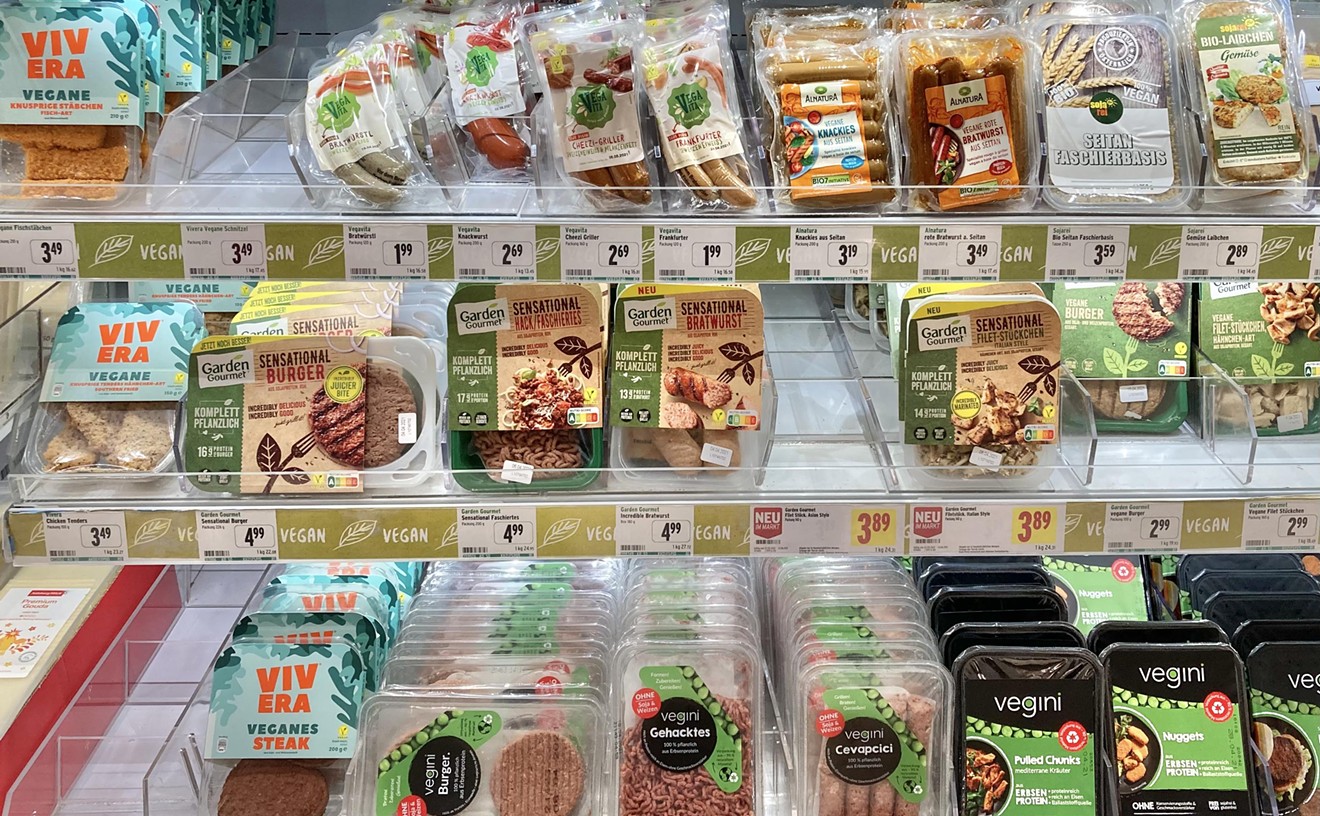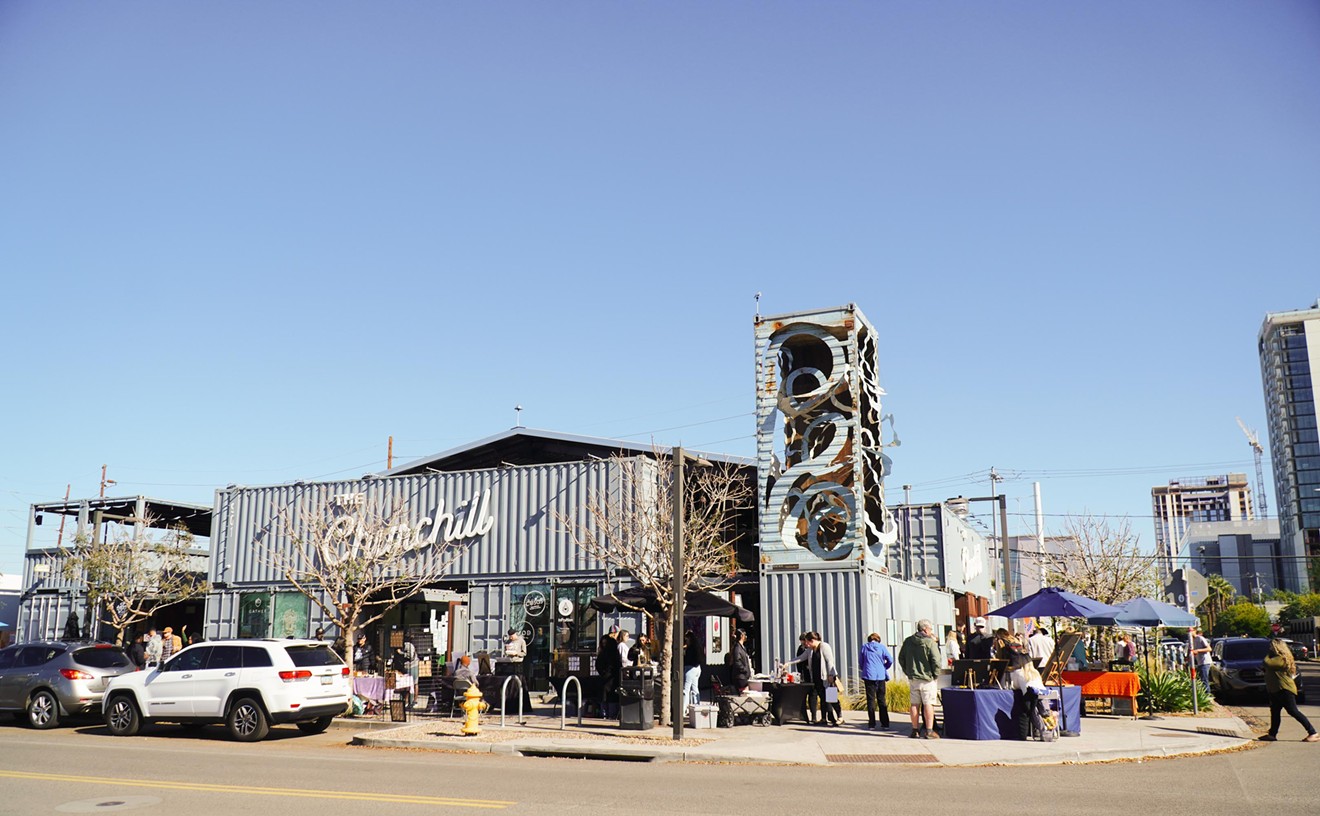After they've settled in and the novelty of Big Macs wears off, many of our new residents find themselves craving the foods of their upbringing. Some, finding little in the way of ethnic staples here, take the brave step into entrepreneurialism -- that American dream of owning one's own business. They open specialty grocery stores and, if we're lucky, restaurants.
The search for a better life is what has brought the Valley such shops as Bosnian Delicious Food in Phoenix, Russian Market in Phoenix and Benchris African Caribbean Market in Glendale. And now, Mex-Sal North, a restaurant specializing in the cuisine of El Salvador.
Owned by Sonia and Neo Lazo, Mex-Sal came about after Sonia's mother was driven out of El Salvador by constant war. Mom had owned two restaurants there, and after relocating to the Valley, Sonia herself worked in several chef positions. She says the impulse to open her own eatery came to her, quite literally, in a dream.
Although Mex-Sal looks like it might still be expecting violence (the thick floor-to-ceiling bars on the entry windows are intimidating), once inside, all is sweetness and light. The Lazos keep things a family affair with pleasant, almost shy service, cheerfully explaining (in Spanish) what specific menu items include.
It's welcome attention -- some ingredients defy even the most encompassing culinary dictionary. El Salvador is in Central America, just south of Guatemala, and its cuisine has a strong Mexican influence -- favorites include tamales, enchiladas, burritos, chorizo, chile rellenos and such. Salvadoran food, however, is distinguished by milder spicing and greater use of vegetables. And while Mex-Sal caters to its neighborhood by offering a full menu of traditional Mexican dishes, too, its heart and soul remain firmly in El Salvador.
The only problem? Salvadoran food, by its nature, and from my experience along its Guatemalan border, typically isn't thrilling. For Valley folks who aren't used to touring beyond their own zip code, the adventure likely will be more for the experience than the cuisine. But give it a try -- several dishes are worth a trek into Mex-Sal's industrial-park area.
Mex-Sal isn't much to look at, for sure. White walls are hung with a crazy quilt of Central American posters, serapes hang across the front windows, seen-better-days piñatas dangle and flags advertising beer rustle in the breeze of air conditioning. An area that's sometimes a Salvadoran grocery is most often used to store cleaning supplies, but folks in need will find the Lazos happy to give them the goods on request.
Did the Lazos go deaf from exploding shells before their escape, though? Almost always, a TV set to the Spanish station blares at full blast, as does a jukebox playing Spanish CDs, and a radio screeching, you guessed it, mariachi music. All at once. Given that except for weekend nights, the place plays to a fairly insignificant crowd, the din is deafening.
Perhaps baskets of chips aren't authentic Salvadoran, but it would be nice to have something to dip into the little dishes of punchy tomatillo and red sauce that arrive with our drink orders. Food is cooked to order here, and it takes time, even for a no-nonsense cheese crisp. Diehards can -- and we do -- snack on curtido, a ubiquitous condiment of cabbage, carrot and onion, finely shredded, pickled in cider vinegar and served at room temperature.
Curtido is to be piled atop most dishes, including pupusas, the national dish of El Salvador. These are akin to pancakes, fashioned from masa, stuffed with various bits and griddled until speckled brown and puffed. Natives purchase the little bundles from street vendors and wander along, noshing on pupusas like New Yorkers with hot dogs.
Mex-Sal's version (two per order) is a great way to sample the culture, although I'd happily pay a bit more for more substantial filling. There's barely a smear of the star ingredient in the "house" pork pocket, the frijol y queso (beans and mild white cheese), the chicharron y queso (pork crackling and cheese), or camaron (shrimp). Loroco y queso offers the most impact, although it may take a few bites for first-timers to adjust to the bitterish, earthy nuance of loroco, the stems of a native flower reminiscent of broccoli. Keep in mind that Salvadoran food benefits from blended flavors, and the loroco sings under a splash of tomatillo and crunches of sharp curtido. For the full experience, pair the dish with sips of beer, sugar-rich Pepsi imported from Guadalajara or refrescos naturales (sweet, natural fruit drinks). I'm partial to the licuado de papaya, or the licuado de mamey, drawn from a fruit that resembles an elongated coconut.
The Lazos have poured their hearts into their eatery, having worked on their days off from their former jobs to renovate what was previously a clothing store. Neo laid the black-and-white tile floor, painted the interior and exterior and built the small kitchen in the rear. They became involuntary experts on the City of Phoenix's building codes, inspections and costly utilities. At one point prior to opening, a Chicanos Por La Causa consultant warned them that, based on expenses and projections, Mex-Sal North would barely support itself. But Sonia's mother told her that what she'd started she had to finish -- no backing out. All this just so we could enjoy a taste of Salvadoran tamal?
The glutton in me is just fine with that. These tamals are stellar, the tamal de elote more like vaguely sweet cornbread, dry and crumbly and served in an open-face husk. The crowning touch is a puddle of crèma, a silky, mild sour cream with the loose consistency of yogurt. A forkful of tamal, a dip of crèma -- nirvana.
Crèma puts sparks in another entree, platano frito. Literally, this means fried bananas, but they're plantains, the firmer, less sweet variety of the fruit. Two whole plantains are finished to a luscious golden brown, caramelized on the edges and served alongside a pool of creamy refrieds. Layer the flavors on your fork, and you'll understand why certain dishes become national treasures.
I'm willing to learn. Did the Chinese ever occupy El Salvador? Actually, it would have to have been Chinese transplanted to the States, then relocated to Central America. Because the plato de chaomin served here is just as it sounds phonetically -- the American-Chinese creation chow mein. Who cares where it came from, let's just be pleased it landed at this strip mall on the west side.
Who'd have thought thin spaghetti noodles could be so endearing, tossed with julienne carrot, onion, green pepper and bay shrimp? There's little to the sauce -- butter and a few timid herbs as far as I can discern -- but it's all surprisingly tasty.
Perhaps the French stopped by, too. Salpicón, typically a French dish, actually originates from the Spanish sal (salt) and picar (cut). Forget the linguistics lesson, just focus on a pile of moist, finely shredded beef. It's a build-your-own deal: Pull a portion of pupusa, stuff it with meat plus sides of buttery white rice, raw onion bits, tomato niblets, curdito and cilantro. A spritz of lemon wedges, a splash of green sauce and we're good to go.
Carne de puerco guisada is less interesting. It's supposed to be stew, but it's more like that ultra-thin wanna-be that most of us have created as we've worked our way toward mastering a Crockpot. Boring is an understatement for this dish of pork, carrot fingers, large chunked potato and sliced onion served alongside beans and rice.
Ample dashes of habanero are required for the desayuno Salvadoreno, too. The breakfast dish features Salvadoran chorizo, meaning pork sausage with none of the trademark Mexican seasoning. Mixed with scrambled eggs and a bit of red chile, this is purely peasant food. A side of casamiento, though, is excellent. It's herbed black beans with white rice cooked in chicken broth, and the combination is delicious.
Mex-Sal's tried-and-true Mexican dishes are less successful, primarily because low-quality ingredients, in such a familiar form, can't hide. The best of the bunch is camaron à la diabla -- devil's shrimp -- slathered with dark, fiery chipotle sauce. The small shrimp are so-so, but the sauce makes up for it, wrapped in flour tortillas and spread with sides of beans, rice, lettuce and curdito.
Tacos look good -- the soft corn tortillas topped with chopped carne or chicken, cilantro and onion. But the meat is tough and gristly; the chicken stringy and off-tasting. A machaca burrito doesn't make it, either, tasting of unscraped grill and stuffed with dry meat, runny egg, tomato, jalapeño, and refried beans.
And chuck the chicken soup, a giant crock of cocido stocked with a whole drumstick and rib, large chunks of tomato and potato, chimayo, elbow macaroni, rice, carrot and corn on the cob. The downfall's in the broth, basically oily water floating with pimply poultry skin. Spiked with generous amounts of salsa, the dish is barely okay.
There are a million better places for Mexican food in the Valley. But for the spirit of El Salvador, Mex-Sal North is winning the battle.










